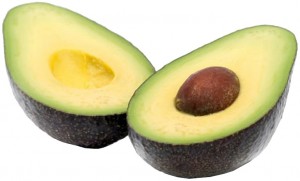13 Surprising Health Benefits of Avocados

Geri Wohl, CNC www.bettereatingcoach.com
Considered a vegetable, but actually a fruit, avocados are rich in health-promoting compounds. Avocados are in the same family as cinnamon and bay laurels. Native to Central and South America, they are also called alligator pears. There are three main categories of avocados that originate from and thrive in different regions; the West Indian, Guatemalan and Mexican. The varieties best known to us are the Haas and Fuerte. Most avocados eaten in the US are Haas avocados, recognized by their dark, knobby skin. Fuerte avocados, with smooth, dark green skin, contain less oil than the Haas avocados.
Let’s take a look at what is inside these nutrient dense fruits. Avocados are known for being high in fat, particularly the monounsatured fat. In addition, they contain more than 25 essential nutrients including vitamins A, B, C, E and K as well as potassium, magnesium, iron, copper, fiber and protein. One avocado has the potassium content equivalent to that of 2-3 bananas! They are calorie dense–half an avocado is about 160 calories. They contain all 18 essential amino acids that make a complete protein in an easily absorbable form. They have no cholesterol and are low in carbohydrates. In addition, they are very alkalinizing for our systems. For more on the benefits of alkalinizing foods, see my article http://www.bettereatingcoach.com/121112-its-good-to-be-green.html.
Many of avocado’s calories come from fat, specifically the monounsaturated fats. The monounsaturated fats have been shown in research studies to reduce the risk of heart disease by possibly helping lower LDL levels while boosting HDL levels and regulating triglycerides. Other foods with these beneficial monounsaturated fats are olive oil, sesame oil, almonds, pecans and cashews. In addition, the monounsaturated fat in avocado called oleic acid facilitates the absorption of the fat-soluble vitamins (vitamins A, E, and K) and phytochemicals (carotenes).
 Even though we all associate eating fats with being fat, that assumption is not the case. Fats are an essential part of the diet. Knowing how to make appropriate choices of which fats to consume will benefit your health and well-being. For more information about choosing which fats to eat, contact me at http://www.bettereatingcoach.com/index.html. Fats are concentrated sources of energy for us to use. They are the building blocks for every cell membrane in the body, and they protect our organs and cells. In addition, they are used to help with nerve transmission and assist in body temperature regulation. They are precursors to the steroid hormones (which include our sex hormones) and are essential to proper brain function. The brain with its neurons and glial cells is actually 60% fat!
Even though we all associate eating fats with being fat, that assumption is not the case. Fats are an essential part of the diet. Knowing how to make appropriate choices of which fats to consume will benefit your health and well-being. For more information about choosing which fats to eat, contact me at http://www.bettereatingcoach.com/index.html. Fats are concentrated sources of energy for us to use. They are the building blocks for every cell membrane in the body, and they protect our organs and cells. In addition, they are used to help with nerve transmission and assist in body temperature regulation. They are precursors to the steroid hormones (which include our sex hormones) and are essential to proper brain function. The brain with its neurons and glial cells is actually 60% fat!
Here are 13 important areas where fat benefits us:
- Healthy heart—Vitamins B6 and folic acid in avocados help regulate homocysteine, a marker of heart disease. The monounsaturated fats help promote cardiovascular health.
- Lower LDL cholesterol levels—A fatty compound in avocados acts to prevent absorption of cholesterol by competing with cholesterol. In addition, these compounds may lower production of LDL cholesterol.
- Blood pressure regulation—Since avocados are a great source of potassium, they help to control blood pressure levels.
- Anti-inflammatory properties—These properties are believed to arise from carotenoids, specifically beta-carotene and lycopene. The greatest concentration of carotenoids is in the dark green flesh just underneath the avocado skin.
- Vision support—As avocados are an excellent source of lutein, they may help support vision and protect against age-related macular degeneration and cataracts.
- Blood sugar regulation—The healthy fats found in avocados may help reverse insulin resistance. The soluble fiber also has been found to promote blood sugar stability.
- Birth defect prevention—The high levels of folate (1 cup contains 23% RDA) in avocados are beneficial as folate is essential in preventing neural tube defects.
- Stroke reduction—Folate may also help to prevent strokes. In addition, the omega-3 fatty acids in avocados also act as anti-inflammatory compounds.
- Anti-aging—The high levels of antioxidants may be beneficial in reducing aging symptoms. The glutathione may boost the immune system and promote a healthy nervous system.
- Halitosis—Avocados can act as a natural mouthwash. They will cleanse the intestines that are directly involved in causing bad breath.
- Nutrient absorption—The healthy fats will facilitate the absorption of fat-soluble vitamins and other compounds, making them readily available for use throughout the body.
- Skin and hair care—The B vitamins and vitamin E in both avocados and avocado oil nourish the skin and hair and act as moisturizers. You can help add luster to hair by mashing an avocado and mixing with water to form a paste. Rub into hair for 5 minutes before thoroughly rinsing.
- Brain support—The healthy fats in avocados are beneficial throughout the brain in both cell health and nerve transmission. For more information about brain support, see my article http://www.bettereatingcoach.com/82112-brain-food.html.
Avocados are best bought when not too ripe. Leave at room temperature to ripen and then they can be refrigerated for up to a week. The flesh has a creamy buttery texture. The best way to open an avocado is to cut it in half lengthwise. Take both halves and twist in opposite directions until it breaks apart. Remove the pit. Then using thumb and index finger, peel the skin away from the flesh. Eat avocados raw to preserve the healthy fats. Squeezing lemon or lime juice will help to prevent excess browning when in contact with air. Enjoy in guacamole or in salads!










